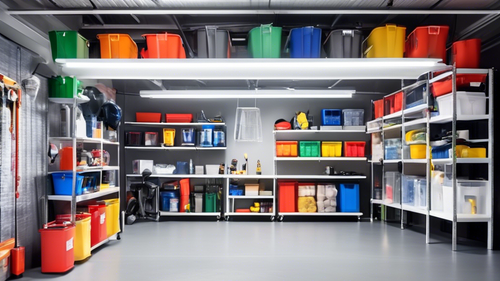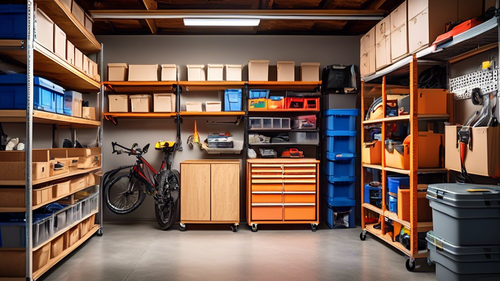
What's Holding You Back From a Clutter-Free Life?
Share
You're stuck in a cluttered space, despite knowing the benefits of a clutter-free life. What's holding you back? It might be emotional attachment to sentimental items, making it hard to let go. Perhaps physical limitations or health issues make decluttering a challenging task. You might be struggling to find time and energy to start, or feeling overwhelmed by the sheer amount of stuff. Maybe you're afraid to let go completely, fearing the emotional impact. Whatever the reason, it's clear that clutter is controlling your space and your emotions. But what if you could break free from these barriers and finally achieve the clutter-free life you desire?
Key Takeaways
• Emotional attachment to physical objects and sentimental items holds you back from achieving a clutter-free life.
• Physical limitations and health issues, such as mobility challenges and chronic pain, can make decluttering a daunting task.
• Lack of time and energy, often resulting from clutter itself, hinders the decluttering process and creates a vicious cycle.
• The overwhelming task of decluttering an entire space can lead to procrastination and stagnation.
• Fear of letting go of sentimental items and the emotional bonds attached to them can paralyze individuals from making progress towards a clutter-free life.
Emotional Attachment to Stuff
As you stand amidst the cluttered rooms and overflowing storage spaces, you're likely holding onto more than just physical objects - you're grasping emotional attachments that make it difficult to let go of even the most insignificant items. Sentimental items, such as gifts from loved ones or mementos from special events, can be particularly challenging to part with. These attachment triggers can evoke strong emotions, making it hard to rationalize their removal.
To overcome these emotional hurdles, it's important to acknowledge the memories and emotions tied to these items. Take a moment to reflect on why you're holding onto each item. Ask yourself if the item still serves a purpose or brings you joy. Be honest with yourself - would keeping it truly enrich your life, or is it simply a symbol of a past memory?
Physical Limitations and Health
You're not just freeing up space by letting go of clutter, you're also creating an environment that's more conducive to your physical well-being, which is especially important if you're living with physical limitations or health conditions that make moving around cluttered spaces a daily struggle.
Living with mobility challenges or chronic pain can make navigating cluttered spaces a challenging task. By decluttering, you're creating a safer and more accessible environment that allows you to move around with ease.
Here are some ways decluttering can improve your daily life:
-
Wider pathways: Clearing clutter from floors and walkways reduces tripping hazards and makes it easier to move around.
-
Less strain: With fewer items to lift or bend for, you'll reduce the physical strain on your body.
-
Easier maintenance: A clutter-free space is easier to clean and maintain, reducing the physical effort required.
- Reduced anxiety: A clutter-free environment can also reduce anxiety and stress, which can exacerbate chronic pain.
Lack of Time and Energy
One of the most significant benefits of decluttering is that it gives you back precious time and energy that would otherwise be spent searching for lost items, cleaning around clutter, and managing overwhelm. However, it's often the lack of time and energy that holds you back from decluttering in the first place. You might feel like you're already stretched too thin, and the thought of tackling your clutter feels like too much to handle.
But what if you could create more time and energy in your life by making a few small changes to your daily routine? Here's a breakdown of how you can do just that:
| Time Management Strategy | Energy-Boosting Tip | Self-Care Reminder |
|---|---|---|
| Prioritize your tasks | Take 10-minute breaks | Practice self-compassion |
| Use a planner or calendar | Get 7-8 hours of sleep | Celebrate small wins |
| Learn to say no | Eat nutritious meals | Take time for self-reflection |
Overwhelming Task Ahead
Decluttering can feel like a daunting task, especially when you're surrounded by clutter that's accumulated over years, making it challenging to know where to start or how to tackle it efficiently. You're not alone in feeling overwhelmed by the sheer amount of stuff that needs to be sorted, organized, and purged.
This feeling of being stuck can lead to mental roadblocks and procrastination, causing you to defer the task altogether. However, recognizing that decluttering is a process that demands patience, persistence, and a clear plan is crucial.
Here are some strategies to help you overcome the daunting task ahead:
-
Divide it into smaller tasks: Divide your decluttering project into manageable chunks, concentrating on one area or category of items at a time.
-
Establish realistic goals and deadlines: Create a schedule that suits you, and commit to adhering to it.
-
Find support and accountability: Share your goals with a friend or family member and ask them to hold you responsible.
- Commend small victories: Acknowledge and praise your progress along the way to stay motivated and encouraged.
Fear of Letting Go Completely
As you begin to sort through your belongings, a lingering fear may creep in: the fear of letting go completely, of parting with items that hold sentimental value or seem too useful to discard. This fear can be overwhelming, causing you to hesitate and second-guess your decisions. You may worry that you'll regret letting go of something important or that you'll need it someday.
Underneath this fear lies a deeper issue: attachment. You've formed emotional bonds with your possessions, and letting them go feels like losing a part of yourself. This attachment is rooted in mental barriers, making it difficult to distinguish between what's truly valuable and what's just taking up space.
Anxiety and control issues also come into play, as you try to hold onto things that make you feel secure or in control. To overcome this fear, acknowledge that it's normal to feel attached to your belongings. Recognize that holding onto everything isn't the solution.
Instead, focus on the benefits of letting go: the space, the freedom, and the clarity that comes with a clutter-free life. By addressing these underlying issues, you can begin to let go of the emotional weight holding you back and start creating the life you desire.
Frequently Asked Questions
How Do I Declutter With a Family That Resists Change?
"Imagine a ship stuck in the harbor, representing your stuck decluttering journey. You're not alone; family dynamics and resistance to change can be overwhelming. Start by acknowledging emotional attachments, then involve your family in small, manageable decluttering tasks to build momentum and create a ripple effect."
Can I Still Be Sentimental Without Keeping Everything?
You can still be sentimental without keeping everything by adopting mindful minimalism, which respects emotional value. Implement decluttering techniques like taking photos, letting go of duplicates, and creating a memory box to preserve sentimental attachments.
What if I Need Items Again in the Future?
'What if you need it again?' echoes in your mind, but what if you could find alternative storage solutions and adopt a minimalist mindset, freeing you from the weight of 'just in case' and accessing a more intentional, clutter-free you?
Is It Worth Hiring a Professional Organizer for Help?
If you're struggling to get started, consider hiring a professional organizer who can tailor a DIY organization plan to your needs, and even provide guidance on digital decluttering, giving you a fresh, innovative start.
Will a Clutter-Free Life Really Increase My Productivity?
You're finally cutting to the chase, wondering if a clutter-free life will really boost your productivity. The answer is yes! With a clutter-free space, you'll master time management, and reap psychological benefits like reduced stress and increased focus.
Related Posts
-

Ceiling Storage Solutions for Your Garage
Unlocking the Sky's the Limit with Ceiling Storage Solutions for Your Garage Declutter and Maximize Your Space with ...
-

Garage Roof Storage: Options and Considerations
The Unseen Space Saver As a homeowner, I've always faced the dilemma of finding ample storage space without clutte...

